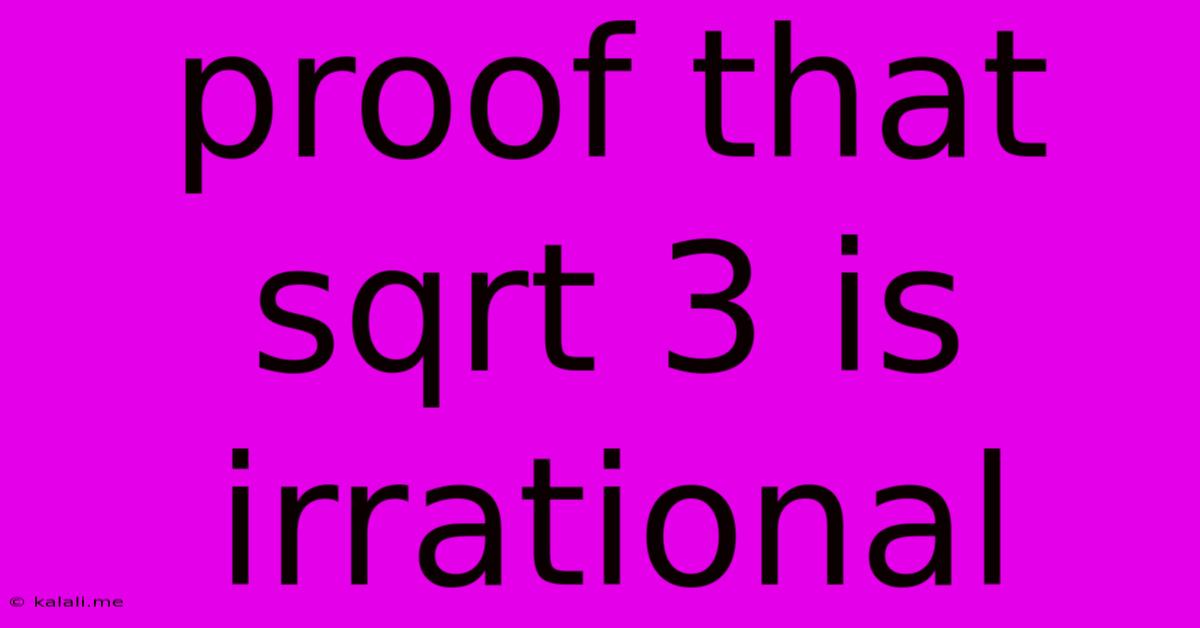Proof That Sqrt 3 Is Irrational
Kalali
May 29, 2025 · 3 min read

Table of Contents
Proof that √3 is Irrational: A Comprehensive Guide
Meta Description: This article provides a clear and concise proof demonstrating that the square root of 3 (√3) is an irrational number, explaining the method and its implications. Learn about the proof by contradiction and its importance in mathematics.
The square root of 3 (√3), approximately 1.732, is a number that has fascinated mathematicians for centuries. Unlike rational numbers, which can be expressed as a fraction of two integers (like 1/2 or 3/4), √3 is classified as irrational. This means it cannot be represented as a simple fraction. This article presents a rigorous proof to demonstrate this fact.
Understanding Rational and Irrational Numbers
Before delving into the proof, let's briefly revisit the definitions:
-
Rational Numbers: These numbers can be expressed in the form p/q, where p and q are integers, and q is not zero. Examples include 1/2, -3/4, and 7. (Note that 7 can be written as 7/1).
-
Irrational Numbers: These numbers cannot be expressed as a fraction of two integers. Famous examples include π (pi) and e (Euler's number). Irrational numbers have decimal expansions that are non-terminating and non-repeating.
Proving √3 is Irrational: The Proof by Contradiction
The most common and elegant way to prove √3 is irrational is using a technique called proof by contradiction. This method assumes the opposite of what we want to prove and then shows that this assumption leads to a contradiction. If the assumption leads to a contradiction, it must be false, thereby proving the original statement.
Here's how the proof unfolds:
-
Assumption: Let's assume that √3 is rational. This means it can be expressed as a fraction p/q, where p and q are integers, q ≠ 0, and the fraction is in its simplest form (meaning p and q have no common factors other than 1). So, we have:
√3 = p/q
-
Squaring Both Sides: Squaring both sides of the equation, we get:
3 = p²/q²
-
Rearranging the Equation: Rearranging the equation, we have:
3q² = p²
-
Deduction: This equation tells us that p² is a multiple of 3. Since 3 is a prime number, this implies that p itself must also be a multiple of 3. We can express this as:
p = 3k (where k is an integer)
-
Substitution: Substituting p = 3k into the equation 3q² = p², we get:
3q² = (3k)² 3q² = 9k² q² = 3k²
-
Another Deduction: This equation shows that q² is also a multiple of 3, and therefore, q must be a multiple of 3 as well.
-
Contradiction: We've now shown that both p and q are multiples of 3. This contradicts our initial assumption that the fraction p/q is in its simplest form (having no common factors). If both p and q are divisible by 3, they share a common factor, which is a contradiction.
-
Conclusion: Since our initial assumption leads to a contradiction, the assumption must be false. Therefore, √3 cannot be expressed as a fraction p/q, and it is irrational.
The Significance of this Proof
This proof highlights the power of proof by contradiction and underscores the fundamental differences between rational and irrational numbers. Understanding the irrationality of √3 and similar numbers is crucial in various branches of mathematics, including algebra, calculus, and number theory. It also contributes to a deeper appreciation of the richness and complexity of the number system.
Latest Posts
Latest Posts
-
What To Call A Letter Sent Post Death
May 30, 2025
-
How Do You Say Bowl In Spanish
May 30, 2025
-
Ender 3 Steppers Buzz After Installing New Ones
May 30, 2025
-
Temperature On Dark Side Of Moon
May 30, 2025
-
How To Drop In On Alexa
May 30, 2025
Related Post
Thank you for visiting our website which covers about Proof That Sqrt 3 Is Irrational . We hope the information provided has been useful to you. Feel free to contact us if you have any questions or need further assistance. See you next time and don't miss to bookmark.